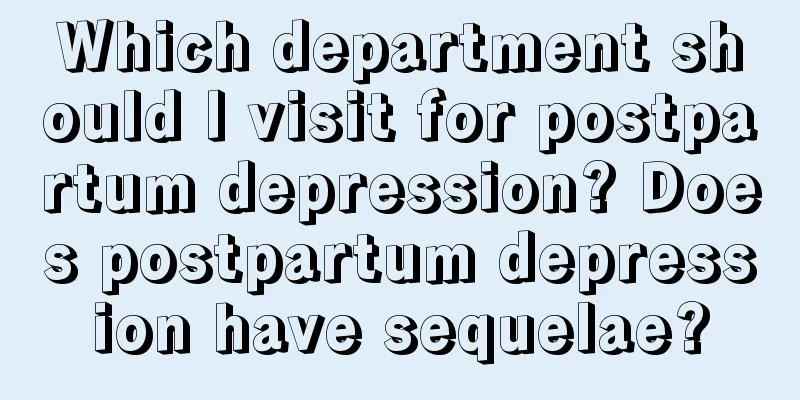Which department should I visit for postpartum depression? Does postpartum depression have sequelae?

|
Postpartum depression is a common phenomenon in women who have just given birth. The cure rate for postpartum depression is very high now, so if you find that you have postpartum depression, you should actively cooperate with the treatment. So which department should you go to for postpartum depression? Does postpartum depression have sequelae? Which department should I visit for postpartum depression?The most important thing about postpartum depression is to learn to adjust your own psychology. If necessary, you can see a gynecologist or go to the psychiatric department of a regular hospital to find a psychologist to consult and treat with traditional Chinese medicine. Postpartum depression is the most common type of mental disorder in women. It is a series of physical, emotional, and psychological changes caused by sex hormones, social roles, and psychological changes after women give birth. Typical postpartum depression occurs within 6 weeks after delivery and can last throughout the puerperium, and some even last until before the child goes to school. The incidence of postpartum depression is 15% to 30%. Postpartum depression usually develops within 6 weeks and can recover on its own in 3 to 6 months, but severe cases can last for 1 to 2 years, and the recurrence rate is 20% to 30% in the next pregnancy. The most prominent symptom of the patient is persistent depression, manifested as gloomy expression, listlessness, sleepiness, easy tears and crying. Patients often use words such as "depressed", "dreary", "dull", "empty", "lonely", and "seemingly separated from others by a wall" to describe their mood. Patients often feel depressed and depressed, and often lose their temper over trivial matters. Over a long period of time, the mood is low most of the time. Even if the mood improves for a few days or 1 to 2 weeks, it will soon fall into depression again. Does postpartum depression have sequelae?There are no sequelae. Generally, postpartum depression does not need to be worried as long as it is treated well. Mild postpartum depression is normal. Most women will have mild depression after giving birth. As long as timely psychological counseling and living habits are improved, it can be cured and will not affect future life. Severe depression may affect life, but there will be no sequelae after treatment. Postpartum depression is a disease with a very high incidence rate, but if it is treated well, there will be no sequelae. Therefore, it must be treated in time. Mild depression can be treated by yourself, but generally severe depression has great harm to the body and mind, and even the whole family will have difficulties. Therefore, psychological prevention should be strengthened in normal times. During pregnancy, psychological conditioning must be strengthened and psychological counseling should be carried out in time. Can postpartum depression heal on its own?Postpartum depression is unlikely to heal itself, because depression itself is a symptom of decreased willpower and not wanting to do anything. If the patient does not take care of the child, many people think that the patient will go to the doctor and take medicine, which will affect the child through breast milk secretion. If the patient does not take medicine, postpartum depression will let the patient heal by herself, which is a painful torment. Most diseases in the world can heal themselves, but time may not be enough. Such a long self-healing time requires a family support system, a social support system, and a psychological support system to support it. If a psychologist goes to the family for treatment once every one or two days, and the care and concern are particularly good, it may be possible, but not everyone can do it. Some mothers do not take medicine when they have problems. It is also good to be able to heal themselves, but time may not be enough, so don't hope for self-healing. It is wisest to seriously find a professional doctor to solve the problem. How long can I take sick leave for postpartum depression?Regarding the question of how to take leave for postpartum depression, first of all, I can tell you for sure that postpartum depression is a mental disorder and you can ask for leave from your work unit for treatment. The so-called postpartum depression mainly refers to the obvious depressive symptoms or typical depressive episodes that women experience during the puerperium. This situation, along with postpartum restlessness and postpartum psychosis, all belong to the puerperium mental syndrome. If you do not pay attention to timely intervention and treatment, it may cause almost devastating damage to the patient's physiology and psychology. Therefore, regarding the question of how to take leave for postpartum depression, you can communicate with your work unit and wait until you are cured before returning to work. |
Recommend
When is the best time to do routine leucorrhea examination? How to read the test report?
The most important thing for couples during pregn...
What should I do if my baby's belly gets cold? What should I do if my baby has a severe nasal congestion at night?
The most important thing in daily care for babies...
Can childhood sepsis be cured? How to treat childhood sepsis?
Generally speaking, sepsis in children is quite s...
Can children eat eggs when they have a cough? How many eggs are best for children to eat when they have a cough?
Children's cough is usually accompanied by a ...
What should I do if my baby likes to use his left hand?
The older generation believes that left-handed pe...
What should I do if my baby has a stuffy nose? What should I do if my baby spits up?
It is common to see newborn babies spit up milk. ...
Can pregnant women drink orange juice? Choose freshly squeezed orange juice
Pregnant women can drink some orange juice in mod...
Can cheese and yogurt provide calcium for babies? How to choose dairy products to supplement calcium for babies?
The nutritional problem of babies concerns parent...
Can I eat a rotten pear? What will happen if I eat a rotten pear?
Pears are a very popular fruit because they are v...
Can Safeguard soap be used to wash underwear? Can Safeguard soap be used to wash clothes?
Normally, we use soap to wash clothes, but unfort...
Can you eat overnight watermelon? What are the dangers of eating overnight watermelon?
What are the dangers of eating overnight watermel...
Is Feihe milk powder good? Introduction to Feihe milk powder
When it comes to Feihe milk powder, everyone shou...
How to give your child a nice name? What are some nice names with meaning?
Naming your child is an issue that many people ta...
How to treat insufficient milk after childbirth? Five treatment methods for you to choose
The most embarrassing thing about feeding a baby ...
Can alcohol wipes be used to wipe the face? Can alcohol wipes be used to wipe wounds?
Alcohol wipes are a type of wet wipes that are co...









